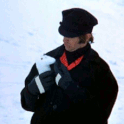How do you boil an egg?
14 Comments
thirschfeldOctober 1, 2010
OK, here is an egg boiled, on high, for thirteen minutes, it falls into the category of a large egg and came out of the fridge at 35 degrees. It immediately went into and ice bath for 10 minutes. The egg is at most 3 days old. With the most recent egg problems I am going to suggest use your eggs. Like any food born pathogen time is one of the big factors in causing food born illness. If you put an egg in water the large end will lift and float. Use it like a calendar, the more the large end rises from 3 o'clock to 12 o'clock the older it is. This three day old egg was spot on 3.
thirschfeldOctober 1, 2010
DonnyG bring that watch to my house and I will even let you pick the egg from the hen house. I hate eggs that have the green halo around the edges as well. Had the same problem with line cooks overcooking them. What I will say is the idea of putting them in cold water and bring them to a boil for a minute and then turning off the heat and letting them sit for 19 will not produce very peelable eggs.
anyoneOctober 1, 2010
I've always been under the impression that the green halo came from overcooking the eggs. Longer than ten minutes. Try it, pull eggs at ten minute and leave one in for twelve or thirteen minutes. I bet you my gold watch the only one with a green halo is the one longest cooked. I believe it has to do with the sulfar in the yolk reaching a certain temp. Ever light a match and see a green flame at first and then smell the sulfar? My line cooks kept trying to send out salads with hard boiled eggs with green halo's and they would try and blame the quality of the eggs. I would have to perform this test to convince them that it wasn't the eggs.
AntoniaJamesSeptember 30, 2010
I'd just add that you don't "boil" eggs at all, if you care what they look and taste like. I use the technique recommended by Mrs. Rombauer in my 1943 edition of The Joy of Cooking. Bring water to a boil, gently add the eggs, and turn the heat down. The eggs will stop the boiling. Just barely simmer the eggs for 25 minutes. (Mrs. R says to simmer them for 35, but they don't need that much time.) Remove and plunge into ice water, adding more cold water to keep the water cold while you crack the shell, thoroughly and all over, under water, rinsing off any small pieces. In my experience, the method prescribed by Real Simple leaves the egg a bit too soft, at least for making deviled eggs. ;o)
Sadassa_UlnaSeptember 30, 2010
I put extra-large eggs in a single layer of a saucepan and add enough cool water to cover by 1/2 inch. Put this pot on the burner set on high; keep an eye on them. As soon as the water starts boiling set a timer for 12 minutes, maybe 10 minutes if using small eggs. When timer rings pour out as much cooking water as possible and add cold water until the water in the pot is lukewarm.
I find that free-range eggs are a lot harder to shell than the regular (factory-farmed) ones. This might be that the free-range ones are generally fresher, but I notice the difference in cracking raw eggs as well: the free-range have thick sturdy shells while the generic eggs have very thin delicate shells. So when making deviled eggs for a crowd, do you save your fingertips by using older and maybe cheaper eggs, or do you serve your friends the freshest and perhaps costliest eggs you can get (and hide your sore red hands)?
I find that free-range eggs are a lot harder to shell than the regular (factory-farmed) ones. This might be that the free-range ones are generally fresher, but I notice the difference in cracking raw eggs as well: the free-range have thick sturdy shells while the generic eggs have very thin delicate shells. So when making deviled eggs for a crowd, do you save your fingertips by using older and maybe cheaper eggs, or do you serve your friends the freshest and perhaps costliest eggs you can get (and hide your sore red hands)?
pierinoSeptember 30, 2010
I'm going with Mr "Funk" T''s reply. I'll add that the term "boil" doesn't always apply, it carries over from English "cooking"---if you can call it that. "Boil" covers a multitude of sins, as with the three witches in "Macbeth".
Amanda H.September 30, 2010
thirschfeld -- yes, that was a question from the crowd, but glad you answered it thoroughly. Someone might search for the same question sometime. Thanks!
thirschfeldSeptember 30, 2010
oh wait, you are doing a talk tonight aren't you cause I am sure you know how to boil and egg. I guess I should look at who wrote the question before I blather on.
thirschfeldSeptember 30, 2010
Well as you can see there are lots of ways to hard boil and egg. First let me say it depends on the age of the egg. If they are fresh they are going to be hard to peel. I have tried all of the above and what I find best is, bring a large pot of water to a boil. Gently add the eggs, cold directly form the fridge, to the water and let them cook for 10 minutes. Drain and drop them into an ice water bath. The colder the better because it separates the membrane from the shell and egg so you can peel them. If they are fresh eggs this cooking time won't turn the edges gray or make them smell like sulfur. That only will happen with old eggs.
bella S.September 30, 2010
Oops. I'm missing a "d". I do hard-boil them. The "har-boil' eggs just aren't the same.
bella S.September 30, 2010
My go to method for har-boiled eggs was something that I read in the the San Francisco Chronicle a number of years ago. For a while they had a "Best Way" section where they did a Cook's Illustrated type of testing. What they found best was to place extra-large eggs in a pot with cold water covering them by 1 inch. Bring the water to a boil and then cook them for 8 minutes. Remove from the heat and drain. I rinse them in cold water and then crack and peel them. No more green "haloes". Works everytime.
buckSeptember 29, 2010
My mom the home exec teacher taught me the same method as Ms. Ward, but to let them rest for 20 minutes, then run cold water over them for a minute before moving them to the refrigerator.
Christina W.September 29, 2010
I follow the Bourdain method. Boil the water to roiling. Add the eggs. Put on the lid. Turn off the heat. Let them be for about 10 minutes.
Kristen M.September 29, 2010
Lots of variations on hard-boiled eggs but here's a great method for creamy but fully cooked yolks, from Real Simple: http://bit.ly/92IWl6
Showing 14 out of 14 Comments
Recommended by Food52
Popular on Food52
Continue After Advertisement








